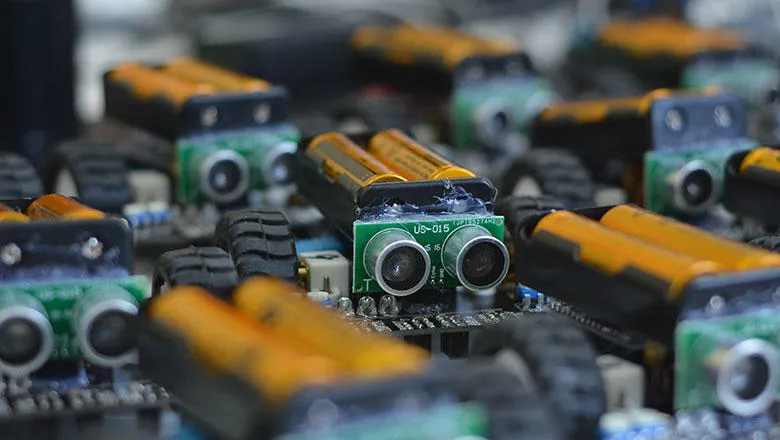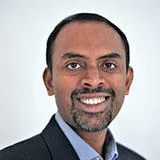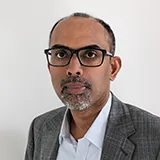I am really excited about collaborating with top-notch academics at King's who are working in the fields of information theory, telecommunications, and robotics within Engineering and Informatics. I am also looking forward to making new collaborations with the researchers in other disciplines such as Neuroscience and the GKT School. I also plan to utilise the state-of-the-art facilities of the London Centre of Nanotechnology for my experimental research.
Dr Bipin Rajendran
10 March 2020
Batteries, Bletchley Park and the brain: Interview with King's new engineers
How can batteries tackle climate change? How will AI benefit society? What happens at the interface of science and engineering?

With recent exciting developments at the Department of Engineering, we spoke to new arrivals Dr Bipin Rajendran and Dr Ann Huang about their inspiration, their research, engineering in 2020 and the power of working across disciplines.

Dr Bipin Rajendran has worked extensively across biomimetic engineering and computation, architecture and systems for intelligent computing and algorithms and analytics for event-driven computing.
What are your main areas of research and what are you currently working on?
Thanks to the advances in Artificial Intelligence (AI) algorithms, computers that diagnose diseases, robots that can walk and run like humans, and cars that can drive on their own have all become a reality over the past decade. However, these systems also consume huge amounts of energy - a recent study found that the carbon footprint associated with training a single AI model that powers such algorithms is equivalent to that of five cars in their lifetime.
My research focuses on developing intelligent and efficient platforms for computing that are inspired by the brain. I am hoping that my research will ultimately lead to machines that are not just intelligent, but also highly efficient, and one day approach the efficiency of the human brain.
At the moment, I am pursuing three research directions: First, I am developing algorithms to process data, inspired by how the neurons in our brain use tiny electrical impulses (spikes) to code and transmit information. Second, I am building highly efficient nanoscale devices that can mimic the key behaviours of neurons and synapses in the brain. Finally, I am devising new architectures that allow billions of such devices to be integrated together, allowing the algorithms to be implemented in an efficient manner.
What do you hope to achieve through your work at Kings?
I am hopeful that my work here at King’s would lead to efficient and intelligent computational platforms that could be universally deployed for a variety of applications that benefit society – personalised medicine, robotics and navigation, and smart sensing are examples of such applications. I am also excited about the entrepreneurial opportunities that may arise from this research, and its potential for positive contributions to the UK economy.
What are the biggest challenges you encounter in your research field?
In spite of the spectacular successes that AI/machine learning has achieved over the past 5-10 years, we have barely scratched the surface in understanding how the human brain is able to do all the complex cognitive tasks we routinely do, that too within a power budget of around 20 Watts. Thus, the grand challenge is to understand and reverse-engineer the brain!
What inspired you to join the field of engineering?
I was always interested in building things, from my early childhood. I really enjoyed physics and mathematics in secondary school. So I decided to pursue a career that would enable me to build things by applying and developing new ideas at the intersection of these fundamental sciences.
Which project, past or present, do you wish you had worked on?
Computers, as we know them today, were designed and built based on projects that were conducted at Bletchley Park during the Second World War. I would have loved to be part of those efforts. The scientists building those machines were all inspired by the brain and were making design choices inspired by what was then known about the workings of the brain. It is hence humbling that even after 75 years of intense engineering efforts around the world, our computers today are nowhere as efficient as the brain.
What advice would you give to someone considering studying Engineering?
Engineering is going through a period of great transformation, primarily due to the advent of AI and associated technologies. It is also becoming very inter-disciplinary, and we will see several exciting developments at the interfaces of medicine and engineering. Hence, I think sound fundamentals in physics, mathematics, and biology will be essential to be a successful engineer in the coming decades.
Please give us an example of engineering enhancing everyday life in 2020 that you particularly like
There are many examples, but I think the one that stands out to me the most is the smartphone. These devices have become so ubiquitous that we take them for granted today and use them for everything we do in our daily life. But remember that the first iPhone was introduced only 12 years ago, so this technology has not been around for that long.
Aside from Engineering, what do you do in your spare time?
My five-year-old daughter thinks that the world revolves around her, so that is a welcome distraction when I get home every day. I also enjoy cooking and travelling, and I am hoping to find some time for sketching as I recently re-discovered it as a very calming past-time and I used to enjoy it many years ago.

Dr Ann Huang's research interests include materials, structures, advanced manufacturing and characterisation technologies for energy storage devices such as batteries and supercapacitors.
What are your main areas of research?
My research focuses on materials and manufacturing techniques for energy storage devices such as batteries and supercapacitors. My research also involves a range of characterisation techniques including electron microscopy, 3D imaging and electrochemical testing to investigate the properties of materials and devices, as well as the process of manufacturing techniques.
What do you hope to achieve through your work at Kings?
I look forward to leading a research team to develop new electrode and electrolyte materials and new electrode structures for energy devices. My research team aims to develop advanced manufacturing techniques to enable these materials and structures at a large scale. I am also excited about collaborating with the academics at King's and London Centre of Nanotechnology to apply novel materials and energy storage technologies to other disciplines.
Is there an Engineer in history, or today, who is your biggest inspiration? And why?
John Frederic Daniell was an early academic at King’s and invented one of the first batteries, the Daniell cell, in 1836. Other than his achievement in the electrochemistry discipline, he also invented a dew-point hygrometer and a register pyrometer that are beneficial to the wide field.
Engineering at King’s is inherently multidisciplinary. Can you give an example of a project you worked on where working across disciplines was key to its success?
Most of the projects that I have worked on are multidisciplinary. One example is a large project on developing next generation solid-state lithium batteries which encompasses multiple research areas including chemistry, materials science, modelling and manufacture engineering, as well as industrial collaborations. Working across multiple disciplines is key to addressing an important challenge of developing solid-state batteries that can be manufactured at a large scale.
Please give us an example of engineering enhancing everyday life in 2020 that you particularly like
Lithium ion batteries have helped power the revolution of portable electronic devices. Most people receive information and read news from a device that is powered by a lithium ion battery nowadays. Batteries and other energy devices are also possible solutions to the future ‘fossil fuel-free society’ for tackling global climate challenges.
What advice would you give to someone considering studying Engineering?
Engineering advancement can help solve current technical problems and create significant value and impact in everyday life. Other than acquiring maths and science knowledge, I would also recommend developing creativity skills because innovation stems from creative ideas.
Aside from Engineering, what do you do in your spare time?
I am an artist who enjoys landscape painting, portrait painting and creating illustrations for books. I like using art to express different interpretations of beauty and stories.

